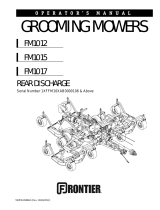
C. Damaged shaft - When the shaft is
worn at the point where the upper
bearing is located in the assembly, it
is a result of the assembly running
loose.
There are two causes for this:
1. Improper torque on the pulley reten-
tion nut. This allows individual com-
ponents of the assembly to move
and wear against other components.
2. Impacts cause the shaft to stretch,
which will lessen the clamp load and
cause the assembly to wear as if
the nut did not have proper torque.
11. Remove the seals, note the direction of the
seals, this will be important during re-
assembly. The upper seal faces inward,
and the lower seal faces outward. If the
lower seal is installed incorrectly, the lower
bearing spacer will crush the seal and
allow dirt into the assembly, causing bear-
ing failure to occur.
12. Remove the bearings and the two small
diameter spacers from the housing. One of
the two spacers removed will look like a
"C" slip and the other will be a thicker
spacer with a hole in it. The open side on
the “C” shaped spacer, in addition to the
lubrication hole in the thicker spacer,
allows grease to pass from the spindle
shaft to the bearings.
Note: When removing the bearings, mark or
isolate the top bearing from the lower
bearing. This will allow the bearings to
be installed in their original operating
position. Failure to do this may cause
premature bearing failure when
reassembled.
Inspect the bearings as follows:
A. Look for the presence of grease, par-
ticularly in the upper bearing. Dry or
cooked grease indicates a lack of
maintenance
B. Look for dirt in the grease. This indi-
cates a bad seal or worn lower bear-
ing spacer. If the unit was recently
4 Spindle Repair Module
Z Master 200 Series
Nut
Zerk
Hardened Washer
Pulley
Seal
Spindle
Housing
Bearing Cone
Large Spacer
Bearing Cup
Small Spacer
Machine “C” Spacer
Snap Ring
Bearing Cup
Bearing Cone
Seal
Bearing Spacer
Spindle Shaft
Blade Bolt
Spring Washer
Grease Axis Hole
Blade
















